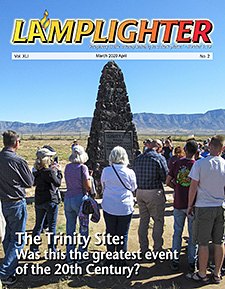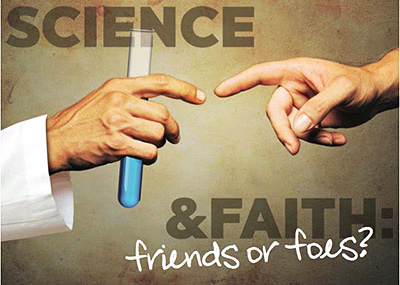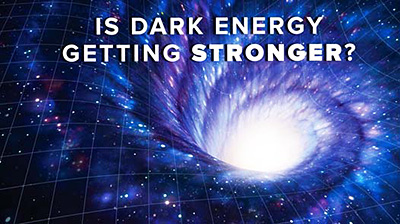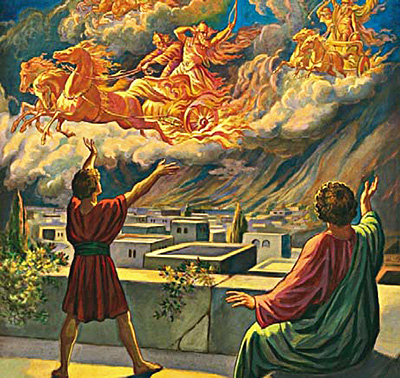“Science Proves the Existence of God!”
Science & Faith

That’s not a headline you expect to see in your local newspaper or scrolling across your favorite cable news station, is it? No, we’ve come to expect modern science to do everything in its power to disprove the existence of God. Or, more properly stated, modern science has developed such an antipathy toward God that it consciously excludes the idea of a supernatural being who exists apart from the universe and actually created the universe.
That was not always so. The earliest western scientists were committed Christians. Their belief that the Lord God established a fixed set of laws governing the universe led them to expect to find order in their analysis of the world around them. Copernicus, Bacon, Kepler, Galileo, Descartes, Pascal, Newton, Boyle, Faraday, Planck and others, all testified that their faith in Jesus Christ inspired their inquisitiveness into His cosmic design.
The Catholic Church vs. Science
Secular historians will point out that many early scientists ran afoul of Church teachings — suggesting that the Christian religion is opposed to scientific truth. Indeed, the Catholic Church had crafted an unbiblical assumption that the entire universe revolved around the earth. Under a progression of Popes, the church warped a biblical truth (mankind was declared to be the highest in God’s created order) into a man-centric belief system. The Bible does not make such an assertion. Instead, writers ask questions like, “What is man, that You take thought of him?” (Psalm 8:4).
We do acknowledge that for many hundreds of years the Church (once again, the Catholic Church — the only church in the West) banned Bible ownership and reading, propagated hatefilled anti-Semitism under the guise of Replacement Theology, and burned as heretics those who would dare question unbiblical practices like the selling of indulgences. But true faith in the living God of the Bible was never hostile to inquiry and knowledge.
For example, German mathematician and astronomer Johannes Kepler said, “I was merely thinking God’s thoughts after Him. Since we astronomers are priests of the highest God in regard to the book of nature, it benefits us to be thoughtful, not of the glory of our minds, but rather, above all else, of the glory of God.”

The Drift from God
So, how did so much of modern science stray from its origin of “thinking God’s thoughts” after the fact? Why such animosity?
As mankind became more technologically capable, our ability to investigate the natural order grew exponentially. At both the microscopic and the cosmic level, we can gaze into realms unseen and unfathomable to previous generations. Coupled with a growing hubris among many research scientists, there was a growing confidence that we could unlock all the mysteries of the universe. In short, the scientific man’s faith in himself grew to the point that faith in God was superfluous — or even distasteful.
Another dynamic hit the world in the late 19th Century and accelerated this Humanist trend. Men such as Charles Darwin claimed that they could explain the origin and complexity of life through merely natural means. Sigmund Freud claimed that he could explain man’s inner psychology in merely naturalistic or therapeutic terms instead of viewing it as a manifestation of sin. Later, cosmologists such as Carl Sagan declared, “the cosmos is all there is, and all there ever was,” and this was repeated often enough that it began to sound like wisdom.
Their assertions were not based on knowledge that could be gained through observation or measurement — in other words, based on science. Rather, they conjured up hypotheses reflecting their own desire to eliminate God — or man’s need for God — from the discussion.
Governments were some of the first to take advantage of this newfound, unscientific “scientific attitude.” So, in formerly Christian Russia, Soviet taskmasters embraced an atheistic worldview as they killed or subjugated millions. In Lutheran Germany, Adolf Hitler and the Nazi party propagandized a citizenry to accept their ideology dehumanizing Jews, gypsies, the feeble, the mentally deficient and any others who were simply labeled “useless eaters.” In France, Christian faith (albeit Catholic) was ingloriously pushed aside for the sake of reason. Infamously, the statue of Mary that was the namesake of Notre Dame — “Our Lady” in French — was replaced with a statue of the Goddess of Reason. Ironically, those same “reasonable leaders” ushered France into a period of insanity and a bloodbath.
The Reality of the Intangible
But now, the same scientific community that cannot countenance the very idea of a God they cannot see, taste, touch, smell, quantify or measure in any way is suggesting that the universe that we can see, quantify and measure cannot be all there is. Respected scientific publications are printing articles from leading scientists of our day who have come to realize that their previous assumptions about our universe just can’t be true.
As an example, one of the basic assumptions of the scientific community for many years has been that if there is enough matter (mass) in the universe, it will eventually pull everything back together in a cosmic collapse. Many scientists who reject the biblical account of creation believe that a great, uncaused explosion called the “Big Bang” hurled previously nonexistent matter in every direction we call space.
The concept of all matter confined in a single, infinitesimal point strains the imagination, but that is the premise behind the idea. Because that now-existent matter has mass, and gravity acts as a force to pull matter together, the question has been whether the original explosion had enough force to overcome gravity and continue expanding or whether all that mass would eventually collapse back on itself in what is called the “Big Crunch”!
The Unexplainable
Until very recently, we lacked the sophisticated equipment needed to accurately measure cosmic expansion. But, modern technological advances have finally provided an answer. The universe is not only expanding without any hint of deceleration — it is actually expanding faster and faster! This is not what modern science anticipated.
Now, the latest buzzwords have become “dark energy” and “dark matter”— a thinly veiled code to communicate the reality that there must be something out there that we cannot see or measure. There is no other way to explain how the universe would be expanding at an accelerating rate.

(www.pbs.org/video/is-dark-energy-getting-stronger-rgx3zt)
Why is this significant to us as Christians, and what could it possibly have to do with Bible prophecy? Well, for one thing, the same elevated minds that once dismissed the concept of a God who could not be seen or measured have now embraced the idea that there is “dark matter” that cannot be seen or measured.
It reminds me of the evolutionists who finally realized that even eons of time do not make their theory remotely possible, so now they are suggesting that life was planted on earth by aliens from another universe or even another dimension. And they have the audacity to assert that such an idea is much more credible than believing in the God of the Bible!
So, secular astronomers and cosmologists are seriously suggesting that unseeable, unmeasureable energy and matter must make up 95% of the universe. Why are they so willing to take this particular leap of faith? Because their equations tell them it has to be so. Even if they have not yet figured out what to make of this invisible stuff, the undetectable energy and matter has a marked influence on the seeable, measureable stuff in the realm they can observe.
The Christian Worldview
Obviously, for the Christian, God has a marked influence on the seeable, measurable realm in which we live. Through faith in Jesus Christ, lives are changed. Hopeless drunks and drug addicts become inspirational worship leaders. Sinners of every stripe become beacons of virtue and encouragement. Selfabsorbed reprobates become selfless lovers of God and fishers of men.
In other words, Christ — who is presently unseen — has a greater impact in individual lives and throughout our world than any host of world leaders and influential elites who preen for the cameras.
Prophetically, Paul told us in Romans that Mankind has long endeavored to “suppress the truth in unrighteousness” (Romans 1:18). His words are wholly fitting to describe the post-Christian scientific community: “For even though they knew God, they did not honor Him as God or give thanks, but they became futile in their speculations, and their foolish heart was darkened. Professing to be wise, they became fools…” (Romans 1:21-22).
Speaking of darkened hearts, how ironic it is that the terms “dark energy” and “dark matter” are used to describe the obvious void in secular scientists’ understanding of the cosmos. Paul maintains the contrast with enlightened believers by describing those who reject the gospel as being of night and of darkness. He says that destruction will come upon them suddenly when the Day of the Lord arrives (1 Thessalonians 5:1-6).
For those who have rejected the supernatural, only physical senses remain. This truth is so ingrained in our psyche that we immediately recognize the humor in Chico Marx’ question in the movie, Duck Soup, “Well, are you gonna believe me or your own eyes?”
The great prophets like Elisha understood this too. But they were enlightened to see with spiritual eyes. That explains why Elisha’s servant could not see the horses and chariots of fire surrounding the forces besieging Dothan. While his attendant cowered in fear, Elisha was calm and composed. You might even say he had “the assurance of things hoped for, the conviction of things not seen” (Hebrews 11:1).

Lest his attendant collapse from his terror, Elisha prayed, “O LORD, open his eyes that he may see” (2 Kings 6:17). Only then did the man see beyond the mere physical realm. We pray for similar vision today when we sing, “Open the eyes of my heart, Lord.” In contrast, by Elisha’s word, the armies opposed to the Lord’s prophet were rendered physically blind as well as spiritually blind.
Prophets throughout the Bible were able to gaze into heaven itself or peer into the future because they had both the assurance and conviction of God that comes only from the Holy Spirit. It is obvious that unless enabled by the Spirit of God, our physical eyes are inadequate for seeing the spiritual realities around us. And yet, once we put our faith in Jesus Christ as Savior and Lord, the Holy Spirit really does open the eyes of our heart. We become aware of a reality beyond our own physical senses.

Walking in Faith
My own son recently asked me to explain Hebrews 11:1: “Now faith is the assurance of things hoped for, the conviction of things not seen.” I readily admitted that to the mind unilluminated by the Spirit of God, such a verse reads like jabberwocky. It has the sound of a great and wise saying without actually making much sense to those who do not already have the faith it speaks of. That is precisely because faith cannot be seen or measured. And, as I told him, the key is not merely having faith in faith (as Oprah Winfrey is famous for promoting), but rather, having faith in the living God and in His Son, Jesus Christ.
For the child of God who is walking in faith with God, those things that we hope for — the promises of God, the completion of our joy, the perfection of our remaking into the image of Christ, the appearing of our Blessed Hope Himself — are more assured than the mere stuff we can hold in our hand or perceive with our eyes. The “conviction of things not seen” becomes so strong that we understand why C.S. Lewis called this world “the shadowlands” — a faint shadow of the greater reality to come. As the Holy Spirit has illuminated my heart, I’ve come to the point that I am more sure of Jesus Christ and His promises than I am of the material world around me.
Do you have that kind of assurance and conviction? When evil is swirling around you, do you exhibit a peace which passes all worldly understanding? When all other ground is sinking sand, do you stand firmly on an unseen Rock, uncut by human hands but real and trustworthy nevertheless?
A Challenge
In Paul’s letter to the Romans, he prophesied that in the end times men’s minds would grow dark. Thinking themselves educated or wise, they would embrace lies and give themselves over to deceptions and darkness. The father of lies has become increasingly adept at misleading the masses. My prayer is that some will recognize that if scientists now confess that the vast majority of the universe is unseeable and unknowable but real, they will come back to the God who — while unseeable — can be known.
As a matter of fact, that same knowable God did indeed break into our own dimension to demonstrate His desire to be known and to manifest His great love — through the person of Jesus Christ.
If you really seek an evidence-based approach to understanding reality, there is no lack of evidence for God. He has proven Himself over and over. Over 100 years ago Louisa Stead penned words that capture that truth beautifully:
Tis so sweet to trust in Jesus, Just to take Him at His word; Just to rest upon His promise; Just to know, Thus saith the Lord. Jesus, Jesus, how I trust Him, How I’ve proved Him o’er and o’er. Jesus, Jesus, Precious Jesus! O for grace to trust Him more.
With the signs of the times multiplying all around us, this is no time for wavering faith or flagging trust. Christians are in for perilous times ahead — even in America. If you’ve already put your faith in Him, know that you can trust all of His promises — including His promise to come again soon.
If you don’t already know Him as Lord, seize on Jesus’ word to Thomas: “Stop doubting, and believe!” Once you do, you’ll be counted among the multitudes of believers He foretold: “Blessed are they who did not see, and yet believed” (John 20: 27, 29).





